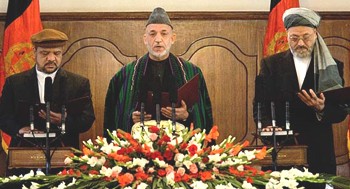By Nick Grono and Candace Rondeaux
AS WASHINGTON rolls out its latest troop surge in Afghanistan, all eyes are on the violent south and east of the country to see whether the additional military muscle will bring stability. But outside observers are looking in the wrong place: They ought to focus on the backroom deals the United States is preparing to make with some notorious warlords, as these will determine the long-term effectiveness of President Obama’s strategy.

President Karzai takes the oath of office alongside Mohammad Qasim Fahim, left, and Karim Khalili, right, his vice-presidents (Photo: Paula Bronstein/Getty Images)
While the White House has paid lip service to the importance of good governance in Afghanistan, the reality is that co-opting violent warlords is at the heart of a plan that will likely result in further instability. One of the warlords who may soon star in the new US efforts to rebrand fundamentalists as potential government partners is Gulbuddin Hekmatyar, a brutal Afghan insurgent commander responsible for dozens of deadly attacks on coalition troops. As a mujahedeen commander during the civil war in the 1990s, Hekmatyar turned his guns on Kabul, slaughtering many thousands of Afghans, with his militias raping and maiming thousands more.
Three decades of warfare in Afghanistan have produced a multitude of warlords and commanders. Institutions have been supplanted by abusive powerholders, who maintain their control through violence, patronage, corruption, and external backing. There was a real opportunity to fundamentally change this dynamic after the fall of the Taliban in 2001, but it was squandered. Instead of rebuilding institutions, and focusing on the rule of law, the United States tried to build peace on the cheap, subcontracting power to many of those abusive warlords who had been marginalized by the Taliban. These same warlords have now seized on their reprieve with a vengeance.
A list of power brokers in Afghanistan today reads a bit like a who’s who of commanders responsible for atrocities during the civil war. While warlords like Afghanistan’s current co-vice presidents Mohammad Qasim Fahim and Karim Khalili have reinvented themselves as powerful officials, Hekmatyar chose a different path. After a brief stint as prime minister before the Taliban charged into Kabul, Hekmatyar, founder of the powerful Hizb-e Islami political party, retreated to Iran in the mid-nineties, only to resurface in 2001 when he declared his opposition to the US military engagement in Afghanistan.

RAWA: Ghairat Baheer, an infamous terrorist of Islamic Party of Gulbuddin was freed by Afghan government in May 2008 in a move for reconciliation with Hezb-e-Islami.
Although once backed by the CIA with scores of millions of dollars in arms, and a favored client of both the Saudi and Pakistani intelligence services during the Soviet occupation in the 1980s, Hekmatyar’s anti-U.S. stance made him the target of a CIA drone attack in 2002, and earned himself a place on a list of designated global terrorists in 2003. He is now believed to shuttle between hideouts in Pakistan’s mountainous tribal areas and in northeast Afghanistan.
In the past year or so Hekmatyar, a charismatic Pashtun Islamic fundamentalist, has begun to raise his profile, granting several interviews with major news outlets and stepping up the tempo of his political propaganda. He has put a lot of effort into restyling himself in a more acceptable guise - as a strong moderate fundamentalist with Afghanistan’s best Islamic interest at heart. This despite his own claims that he plotted with the Taliban to foment a deadly attack that killed 10 French soldiers in August 2008, just one of several violent assaults on coalition troops and Afghan government that he has claimed responsibility for in recent years.
And there are increasing signals that Karzai and the United States are willing to cut a deal with him. Karzai has been the most explicit. He has publicly stated that he would be willing to talk to Hekmatyar and even offer him a position in government if that would help end the fighting in Afghanistan. Washington has been more circumspect, but the signs are there: Senior US officials have indicated that they might be open to a political deal with the insurgent commander. Some interpreted the US release last summer of Hekmatyar’s son-in-law and former Hizb-e Islami spokesman, Ghairat Baheer, who spent years in captivity at the prison in Bagram, as a sign that an agreement might, indeed, be in the works.

RAWA: Abdul Hadi Arghandiwal, the head of the registered wing of Hezb-e Islami Afghanistan in Kabul and former treasury head of the party, was selected as Minister for Economy by Hamid Karzai.
Doing deals with Hekmatyar, or others like him, is a mistake. Similar accords across the border in Pakistan have repeatedly failed. Such appeasement deals give vulnerable Afghan populations little incentive to stand up to the insurgents, especially if they believe that those insurgents have the upper hand. They would send a message that terror pays dividends. And for Kabul and Washington to negotiate from a position of apparent weakness would make long-term political solutions all the more elusive.
Instead of entering into alliances of convenience with the most undesirable of local powerholders, the international community, and the Afghan government, would gain by holding warlords like Hekmatyar accountable for past abuses, and ending the climate of impunity that has allowed so many of them to flourish within and outside government.
Nick Grono is the deputy president at the International Crisis Group in Brussels. Candace Rondeaux is Crisis Group’s senior analyst in Kabul.



